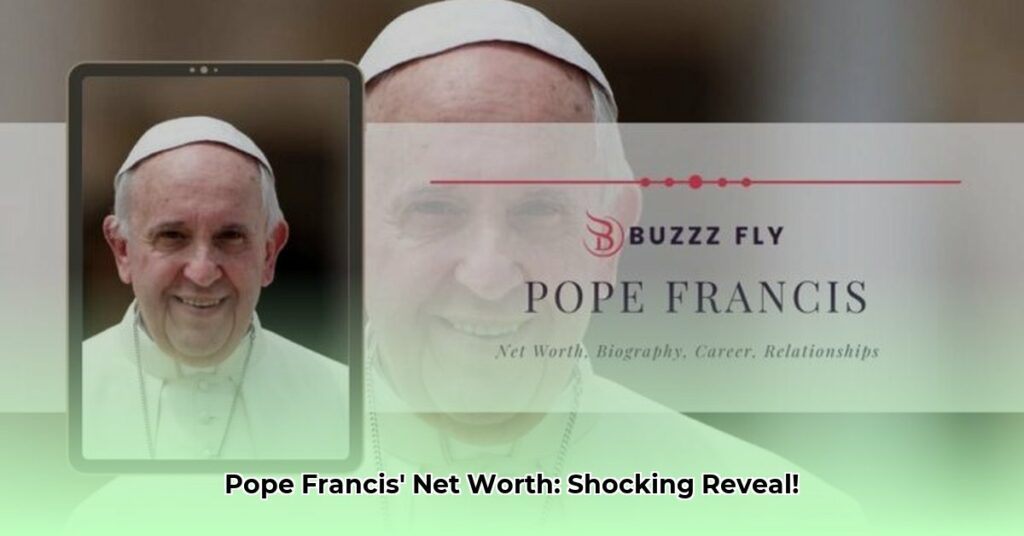The straightforward answer is: Pope Francis had no personal net worth. While he presided over the vast resources of the Vatican, he didn’t personally own them. His vow of poverty, central to his Jesuit faith, meant a life detached from material possessions. This article clarifies the distinction between the Pope’s personal finances and the wealth of the Vatican.
Decoding Papal Finances: Personal Poverty vs. Institutional Wealth
The question of the Pope’s net worth often arises, fueled by images of Vatican opulence. This leads many to assume immense personal wealth. The reality, however, is quite different. Pope Francis, unlike most heads of state, did not accumulate personal wealth. His vow of poverty wasn’t symbolic; it was a lived reality.
The Vow of Poverty: A Life of Simplicity
What does a vow of poverty truly entail? For Pope Francis, it meant a life of deliberate simplicity. He resided in the Vatican guesthouse, Casa Santa Marta, rather than the Apostolic Palace, and chose a Ford Focus over a limousine. He received no salary, and gifts typically went to charity. Upon his death, his personal belongings, likely of minimal value, would have been distributed according to Church tradition, donated, or kept as artifacts. This underscores his commitment to a life detached from material riches.
The Vatican’s Holdings: Billions, Not Millions
The Vatican’s financial picture is vastly different. Experts estimate its holdings between $10 billion and $15 billion, accumulated through centuries of donations, investments, real estate, and an unparalleled art collection. This wealth funds the Church’s global mission, supporting charities, maintaining historical sites, and financing educational initiatives. However, this wealth belongs to the Holy See, the governing body of the Catholic Church, not the Pope personally.
The $16 Million Misconception: Resources, Not Riches
The figure of $16 million often associated with the Pope represents resources available to the office of the papacy, not Pope Francis’s personal wealth. This covers the upkeep of Vatican properties, security, transportation (the “Popemobile”), staff, and art preservation. These resources are essential for the Pope to fulfill his duties but aren’t his personal assets. He couldn’t, for example, sell the Sistine Chapel.
How the Pope Used Vatican Resources: Stewardship, Not Ownership
Pope Francis acted as a steward of these vast resources, utilizing them for the Church’s mission – supporting hospitals, schools, and historical preservation. His modest lifestyle, juxtaposed against the Vatican’s grandeur, exemplifies his commitment to his vow of poverty. He held a position of immense influence within a wealthy institution yet remained personally detached from material possessions.
A Legacy of Service: The True Measure of the Papacy
The papacy’s value lies not in financial wealth, but in spiritual leadership. Pope Francis’s humility and simple living amidst the Vatican’s opulence serve as a powerful message. His life poses important questions about the role of wealth within the Church and how vast resources can best serve its global mission and alleviate suffering. This is a complex issue with ongoing discussions and diverse perspectives within the Church and academia.
Looking Beyond the Headlines: Understanding the Nuances
Understanding the distinction between personal and institutional wealth is crucial. The Vatican, as an institution, holds substantial assets. Pope Francis, as an individual, embraced a life of poverty. This nuanced understanding clarifies the often-misunderstood topic of the Pope’s finances. The evidence suggests that Pope Francis lived a life congruent with his vows, prioritizing service and humility over material wealth.
| Entity | Estimated Value (USD) | Source of Wealth |
|---|---|---|
| Pope Francis | $100 (personal effects) | N/A (Vow of Poverty) |
| The Vatican | $10-15 Billion | Donations, investments, real estate, art |
These figures, particularly for the Vatican, are estimates based on available information. The Vatican’s finances aren’t fully transparent, and the true value of its holdings could vary. Ongoing research may provide greater clarity in the future.
Frequently Asked Questions
Here are some common questions about the Pope and finances:
- Does the Pope receive a salary? No, the Pope does not receive a salary.
- Who owns Vatican City? Vatican City is owned by the Holy See.
- What happens to a Pope’s belongings after they die? Personal items are often given to family, or the Church may keep some as historical artifacts.
- How does the Pope travel? The Pope typically uses a Vatican-provided car for travel outside Vatican City. Within the Vatican, he often walks.
This article aims to provide a clear and accurate understanding of Pope Francis’s finances. It clarifies common misconceptions and highlights the distinction between his personal life of poverty and the Vatican’s substantial holdings. While further research may reveal additional information, the evidence strongly suggests that Pope Francis lived a life of true humility and service, distinct from the wealth of the institution he led.



